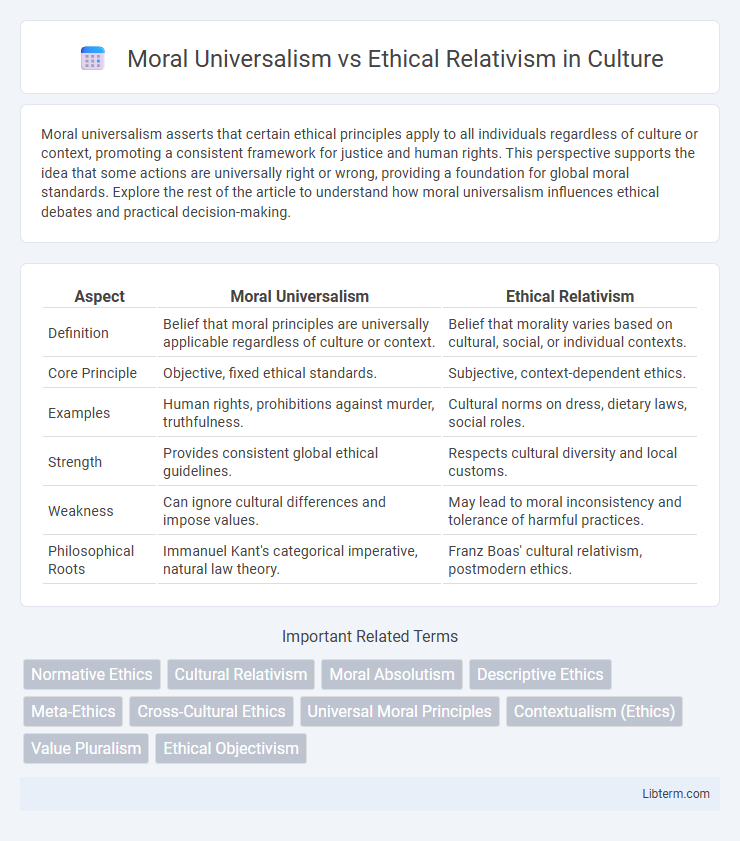Moral universalism asserts that certain ethical principles apply to all individuals regardless of culture or context, promoting a consistent framework for justice and human rights. This perspective supports the idea that some actions are universally right or wrong, providing a foundation for global moral standards. Explore the rest of the article to understand how moral universalism influences ethical debates and practical decision-making.
Table of Comparison
| Aspect | Moral Universalism | Ethical Relativism |
|---|---|---|
| Definition | Belief that moral principles are universally applicable regardless of culture or context. | Belief that morality varies based on cultural, social, or individual contexts. |
| Core Principle | Objective, fixed ethical standards. | Subjective, context-dependent ethics. |
| Examples | Human rights, prohibitions against murder, truthfulness. | Cultural norms on dress, dietary laws, social roles. |
| Strength | Provides consistent global ethical guidelines. | Respects cultural diversity and local customs. |
| Weakness | Can ignore cultural differences and impose values. | May lead to moral inconsistency and tolerance of harmful practices. |
| Philosophical Roots | Immanuel Kant's categorical imperative, natural law theory. | Franz Boas' cultural relativism, postmodern ethics. |
Introduction to Moral Universalism and Ethical Relativism
Moral universalism asserts that certain ethical principles are universally valid and applicable to all individuals, regardless of culture or context. Ethical relativism maintains that moral standards are culturally dependent and vary based on societal norms and values. The debate between these frameworks centers on whether morality is absolute or context-specific, influencing legal systems, human rights discussions, and cross-cultural interactions.
Defining Moral Universalism
Moral Universalism asserts that certain ethical principles apply universally, regardless of culture, time, or context, grounding morality in objective standards such as human rights or justice. This perspective emphasizes that actions like murder or theft are inherently wrong, independent of societal norms or individual beliefs. Defining moral universalism involves recognizing its commitment to consistent moral rules that transcend cultural diversity and subjective perspectives.
Understanding Ethical Relativism
Ethical relativism asserts that moral principles and values are not absolute but vary according to cultural, societal, or individual perspectives, emphasizing the importance of context in ethical decision-making. This framework challenges the idea of universal moral truths by positing that what is considered right or wrong depends on specific cultural norms and traditions. Understanding ethical relativism involves recognizing the diversity of moral beliefs and the need for tolerance and open-mindedness in global ethical discussions.
Key Differences Between Universalism and Relativism
Moral Universalism asserts that certain ethical principles apply to all individuals regardless of culture, promoting consistent standards such as human rights and justice across societies. Ethical Relativism argues that moral judgments and values are culturally dependent and must be understood within specific social or cultural contexts, allowing for diverse ethical practices. The key difference lies in Universalism's commitment to objective, unchanging moral truths, while Relativism emphasizes the variability of ethics based on cultural norms and situational factors.
Historical Origins and Philosophical Roots
Moral universalism finds its roots in the ancient Greek philosophy of Plato and Aristotle, who argued for objective moral principles that apply universally across human societies. Ethical relativism, by contrast, emerged prominently during the 20th century with anthropologists like Franz Boas emphasizing cultural context and variability in moral codes. Historical debates between Enlightenment thinkers such as Immanuel Kant, advocating for universal moral laws, and cultural relativists highlight philosophical divisions on the nature of ethical truths.
Arguments Supporting Moral Universalism
Moral Universalism asserts that certain ethical principles apply consistently across all cultures and societies, grounding morality in objective standards like human rights and justice. Advocates argue that universal moral laws provide a common framework essential for resolving conflicts, promoting global cooperation, and protecting individual dignity. Empirical studies on cross-cultural norms reveal overlapping moral values, supporting the existence of universal ethical foundations despite cultural differences.
Criticisms of Ethical Relativism
Ethical relativism faces criticism for its inability to provide a consistent framework for judging moral actions across different cultures, which can lead to moral paralysis and the tolerance of harmful practices. It also struggles with internal contradictions, as claiming that all moral beliefs are equally valid undermines the possibility of condemning injustices like genocide or human rights violations. Critics argue that ethical relativism lacks objective criteria, making it difficult to resolve conflicts or promote universal human rights effectively.
Real-World Examples and Case Studies
Moral universalism asserts that certain ethical principles apply universally, as seen in human rights laws like the Universal Declaration of Human Rights, which condemns practices such as torture and genocide regardless of culture. Ethical relativism argues that moral standards vary across societies, exemplified by differing views on capital punishment or gender roles, where practices accepted in some cultures might be condemned in others. Case studies like the clash over female genital mutilation highlight how universal human rights perspectives conflict with cultural traditions, illustrating the tension between moral universalism and ethical relativism in practical contexts.
Implications for Cross-Cultural Ethics
Moral universalism asserts that certain ethical principles apply universally, providing a consistent framework for evaluating actions across diverse cultures. This perspective facilitates cross-cultural dialogue by promoting shared moral standards, reducing ethical conflicts rooted in cultural differences. In contrast, ethical relativism emphasizes the contextual nature of morality, recognizing that cultural norms shape ethical judgments and cautioning against imposing one culture's values on another.
Conclusion: Navigating Moral Diversity
Moral universalism asserts the existence of objective ethical standards that apply across all cultures, while ethical relativism emphasizes the variability of moral norms shaped by cultural contexts. Navigating moral diversity requires balancing respect for cultural differences with critical evaluation based on universal principles like human rights. Effective moral discourse embraces pluralism without relinquishing foundational ethical commitments that promote justice and human dignity globally.
Moral Universalism Infographic

 libterm.com
libterm.com